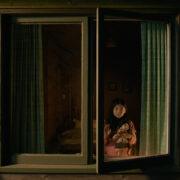INSYRIATED: The Horrors Of War, At Home
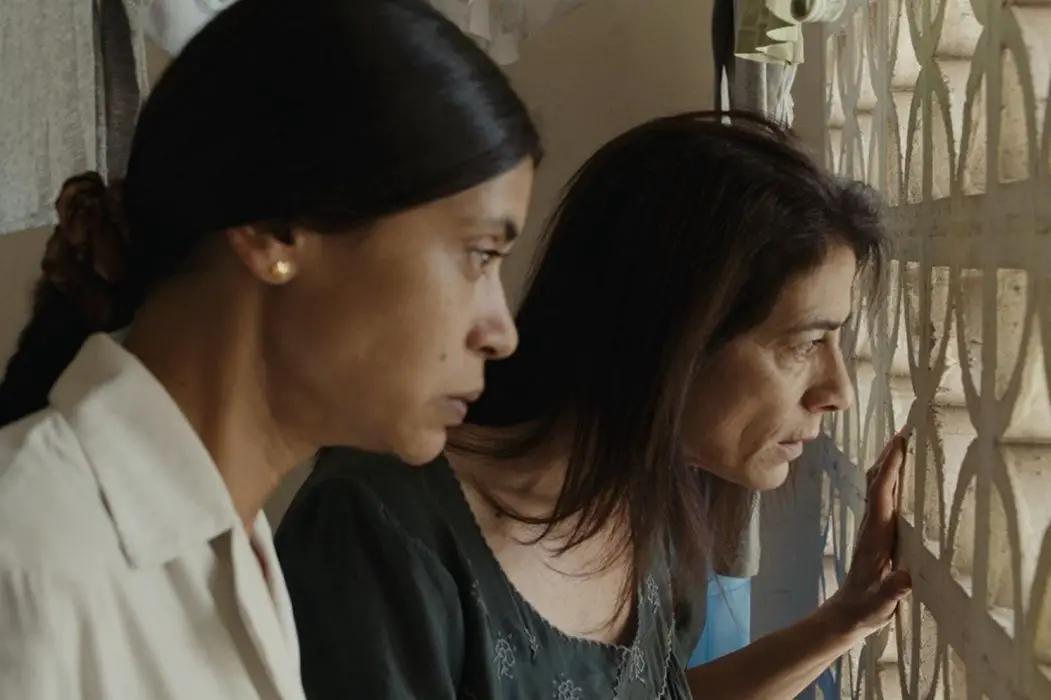
Musanna Ahmed is a freelance film critic writing for Film…
Insyriated. I couldn’t quite tell you the significance of that title. A pun is my educated guess, of what word I’m unsure. The title is the worst thing about this film. In the US, it’s set to be released under the name In Syria, a much more fitting title that succinctly characterizes this taunt, haunting drama that follows a mother trying to keep her family safe inside their apartment in war-torn Syria.
There’s a war going on outside. Bombs are going off, helicopters are flying around, and the piercing sound of a sniper rifle’s bullets signifies that there’s no safe way for one to traverse from one location to another. The film’s first image is a windowsill view of civilians amid the chaos, one being struck down by a sniper and the others fleeing in varying directions. It’s still early in the morning.
Citizens Without Labels
There’s no context provided about who’s shooting who and to whom these civilians’ allegiances lie with but that’s because director Philippe Van Leeuw isn’t concerned with political commentary. There’s no mention of ISIS, Assad, Russia, or any other associated groups or individuals. Not even Syria is name-dropped at any point. He’s simply focused on depicting normal citizens, free of any connotations.
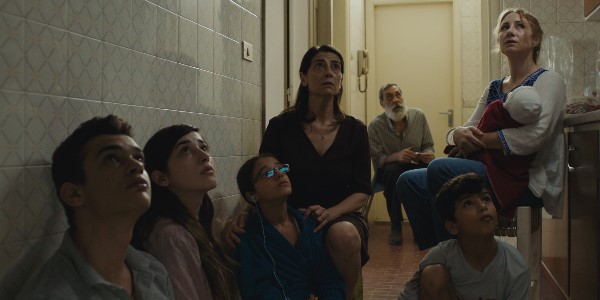
The second shot is a cut to the observer, an old man taking a smoke break by the window. He’s visibly distraught as he finishes the cigarette, which doesn’t help calm his nerves, and turns away. Simultaneously, the camera turns away too, panning the room, stopping at the sight of the flat’s double-barricaded front door. Sombre piano notes punctuate the sad reality for him and everyone around him and foreshadow a dark day ahead of them.
This flat accommodates our central characters, a family of just over half a dozen individuals including the old man, the grandpa of the house. Two of the family’s occupants, principal character Halima (Diamand Bou Abboud) and her husband Samir (Moustapha Al Kar), have intentions to escape along with their baby. Samir informs her that he’s going to see a professor who will help the family flee to Beirut. He takes off and, as he runs up the street, he’s swiftly taken down by a sniper. The family’s cleaner Delhani (Juliette Navis) is the only witness. The war may have been ongoing for a while but when the conflict hits close to home, literally, the family’s fears are heightened.
A Veteran Actress Leads The Way
Enter the matriarch Oum Yazan (Hiam Abbass) who already knows her mission is to protect the family at all costs. The brilliantly talented Abbass (The Visitor, Lemon Tree) is a commanding presence as the guardian of the house, her weathered facial expressions implicating Oum has had a lifetime of taking responsibility for her loved ones. If that’s not figured out in her physical performance alone, it’s also verbalized for us as Delhani speaks to Oum of her fears of dying to which Oum responds “No one’s going to die. Look at me, I was born without a home. This is my home.” Her unwavering confidence in her family’s survival magnifies the tension when certain scenarios suggest the justification of their pessimism.
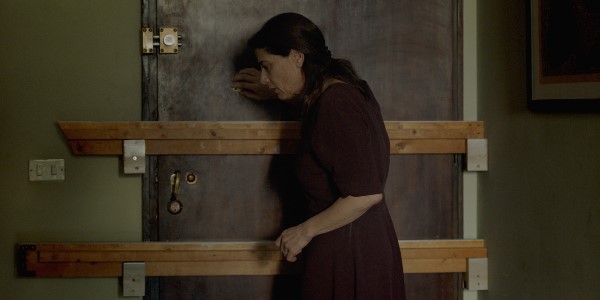
Occasionally, Insyriated enters horror territory when explosions occur in the immediate vicinity and uninvited guests thump on the door. The abruptness of these loud bangs startles us as much as it frightens the family. It’s certainly a scary situation to be in and the characters interact in hushed tones to diminish attention from beyond their four walls. Oum runs laps around the flat to check on her family members and direct them to safety when the sounds of bombs and knocks endanger her home. Her route quickly becomes familiar to us and, with each time we see her execute her domestic search-and-assist operation, the viewing experience becomes more claustrophobic as a result.
Cinematographer-Turned-Director
The camera stays on her in single takes during these scenes, long tracking shots following her around the flat, providing a real-time sense of the terrifyingly short time for safety measures. It’s an effective creative choice that enhances our understanding of the daily experience for the citizens of Syria and how unpredictable life is in a war-zone, even away from the frontlines. It’s a demonstration of Van Leeuw’s key ability to show rather than tell – his primary work as a cinematographer explains his careful consideration of when to move the camera and when a static image is more meaningful, such as the long, fixed shots of Halima recovering after an extremely disturbing incident at the midway point of the movie.
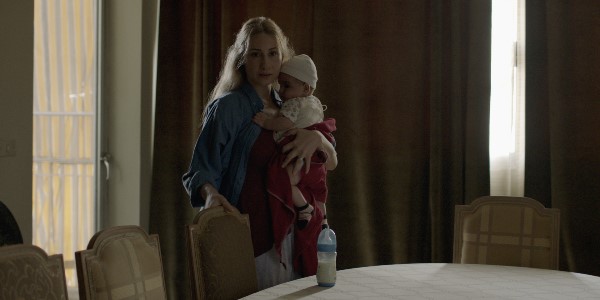
Further evidence of this is the visual exploration of the supporting characters’ personalities: the grandfather is seen looking through a family history photo book and Halima and Samir’s room overflows with rocket and space-related posters, including one of the Dave Mathews Band spaceman. As potentially valuable the richer histories of these characters may have been to the theme of everyday life in a war-zone, the tight and urgent focus on the present happenings means there’s no time to delve into backstories via conversation for both the filmmaker and his characters. There’s only time for the now.
Insyriated: Conclusion
Insyriated is an intense thriller following a particularly hellish day in the life of an ordinary family in Syria. The cast, particularly Abbass, bravely inhabit characters representative of average Syrian citizens, under the concentrated guidance of Van Leeuw. Whilst much of the conversation in the Western world is about the resettlement of Syrian refugees in Europe, Insyriated reminds us of those who can’t even leave their own homes.
What did you think of Insyriated‘s depiction of life at home in Syria?
Insyriated is in UK cinemas now and currently doesn’t have a release date for the USA. Find release dates for other countries here.
Does content like this matter to you?
Become a Member and support film journalism. Unlock access to all of Film Inquiry`s great articles. Join a community of like-minded readers who are passionate about cinema - get access to our private members Network, give back to independent filmmakers, and more.
Musanna Ahmed is a freelance film critic writing for Film Inquiry, The Movie Waffler and The Upcoming. His taste in film knows no boundaries.







